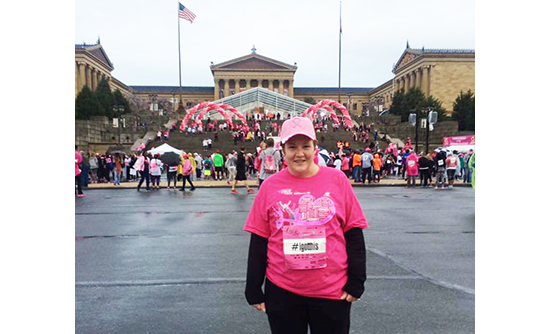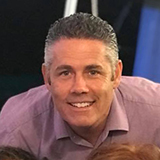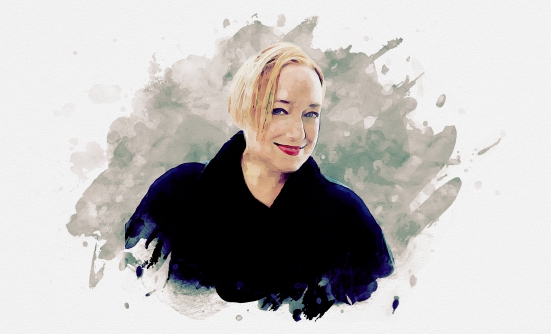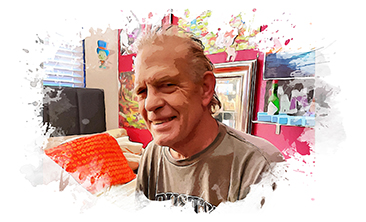When you see the photos and messages on Facebook, the first things you are struck by are both the vulnerability and empowerment of Mary Ficco's posts. The former in her willingness to open up and share her intimate battle with breast cancer. While most people on Facebook are trying to post photos that show their lives in a positive light, Ficco posted photos of herself at chemo sessions wearing a knit cap after she had lost her hair and fighting to show a tired smile. The latter for the fact that despite her battle, she was telling others she was their “reminder” to do self-checks and get screened for cancer.
Prior to being diagnosed with cancer, Ficco had been diligent with self-checks and health screenings. Ficco had witnessed illness within her immediate family growing up and in adulthood. Her father suffered lifelong illness stemming from a car accident. Her mother battled both colon and small-cell lung cancer, and she lost an older brother to a rare brain disease. Being surrounded by these serious health issues played an instrumental part in her keeping up with her own health.
Ficco's cancer experience began with a follow-up biopsy. She was 45 years old, in good health, had a loving husband, Rich, 9-year-old twin boys Colin and RJ, and a demanding career that required her to travel. Breast cancer was not on her busy life’s agenda. Yet, there she was being told by a doctor she had not met before, she had the disease.
During her cancer experience, she talked to friends about regular health screenings and was surprised to hear how many women over age 40 had not had a mammogram or were not doing routine self-checks. It was then that she decided to position herself as a “reminder to self-check and get your mammogram” using Facebook as a way to deliver her messages. While admittedly an outgoing person, Ficco acknowledges initially it wasn’t easy to share her battle on social media.
Along the way, Ficco has served as one part inspiration and one part public service announcement, touching friends, family, and acquaintances' lives by playing out her story on Facebook through a series of updates over the course of a year.
In a recent interview with CONQUER, Ficco talked about her cancer experience, how she used Facebook for her advocacy and therapy, and her plans for the future.
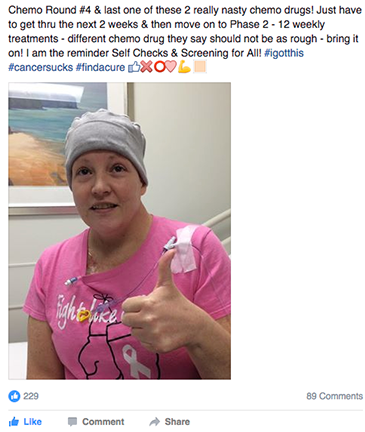
CONQUER: What was it about your health that made you concerned to see a physician in the first place?
Ficco: On my mother’s side there is a family history of breast, ovarian and colon cancer, so I have been pretty diligent with yearly scans and check-up appointments for the past 6 years, since the age of 40. In October 2014, I had my yearly mammogram. I was previously diagnosed with dense breast tissue, so every year I have a mammogram and I am normally called back for an ultrasound as a double-check. I was always told the tissue is dense and looks like cluster of cysts.
The mammogram in October 2014 was my first 3D mammogram, and the results came back “normal.” For the first time in 6 years, I was not called back for further screening. I remember even saying something to my husband that we should celebrate my first normal mammogram. Fast forward 6 months to March 2015, and I felt a lump during a self-check. First I brushed it off. Since I had a “clear” mammogram, I figured it was another cyst. A week or two went by, and I kept feeling it. I went to my OB-GYN, who scheduled a mammogram and ultrasound. The technician didn't see anything on the scan, so the radiologist came in and took over the scan. She thought she saw something small and faint, and decided to prescribe a needle biopsy, which was scheduled for April 17.
CONQUER: Please talk about your cancer diagnosis. What do you remember about when you first found out?
Ficco: When I went in for the follow-up appointment after the biopsy, I can remember sitting in the waiting room for longer than normal. I have been getting my mammograms at the same place for years and I don't normally wait for more than a minute or two in the main waiting room. That day I waited for at least 15 to 20 minutes, and I started to get nervous about the results. Prior to that, I really expected the results to be dense tissue and/or cysts.
I was called to the exam room, and the nurse checked the wound of the biopsy and talked to me about that for a few minutes. I finally asked about the biopsy results, and she said the doctor will be coming in to review the results. Then I got really nervous. I was by myself and had left work on my lunch hour for this appointment. My husband was out of town for work and was actually on his way home while I was at the appointment.
The doctor–who I had never seen or met–came in and sat down very close to me. She started with the word “unfortunately,” and it was like a scene from Charlie Brown, where the teacher or adult says “WAH, WAH WAH.” She said, “you have cancer.” I immediately went into defense mode and said it was not possible, I just had a clear mammogram 6 months ago and I am a mom of young kids.
The doctor immediately started talking about how breast cancer is not a death sentence anymore, but as soon as she used the word “death,” I started sobbing. At that point, a hospital oncology nurse navigator came into the room and took over. She already had some preliminary results of my type of cancer, and a number of tests and appointments already scheduled, including a second needle biopsy and a breast MRI. Thinking back, it was pretty impressive. She became my single point of contact for the first few weeks, getting me through all of the additional tests needed before meeting with my team of oncologists to discuss recommended treatment plans.
On that day, after the nurse navigator left the room, I realized I had not talked to my husband. He knew I had this appointment and had called my cell a few times during the appointment. I finally called him, and again became very emotional. He met me at home, and we decided not to tell the kids until I knew everything. This was difficult. At first I did not want to even tell them much, but, I knew I could not keep it from them once surgery and treatment began. I also did not want to tell anyone until I wrapped my head around all of it, so we waited about two weeks to tell immediate family, and then started telling friends and co-workers.
I had to get a second needle biopsy because they thought there was a second small spot and wanted to be sure. The appointment was scheduled for the next day at a different location, and, ironically, or as fate would have it, the same radiologist who took over the ultrasound and did the first biopsy was there to do the second one. When she saw me, I started to cry. We made a connection, and she said she was sorry I was here again. She bent down and whispered in my ear that if she were me she would have both breasts removed. She said that she probably should not say this to me, but as a radiologist she wanted me to know that the tissue in my breasts is so dense that she cannot see the cancer. I believe this woman saved my life. If she did not come in and take over the ultrasound from the technician and also order a biopsy, my outcome may have been much different.
CONQUER: What was it like for you in the first couple of months as you adjusted to treatment, work, and your family life?
Ficco: Adjusting to life after a cancer diagnosis was something that was not easy–to say the least. At the time, I had a very demanding job that required frequent travel. I had just gotten a new boss during a reorganization, which made sharing my news even harder. However, I received total support from my boss and my peers during treatment.
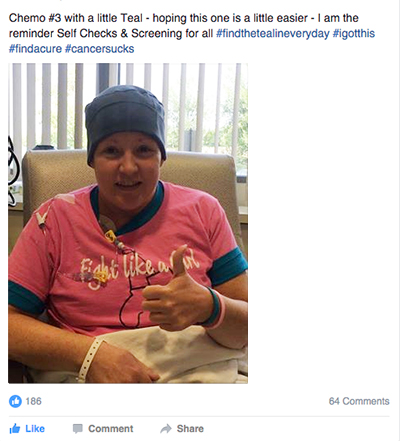
During those initial weeks, focusing on work was not easy at times, but it did keep me distracted, because I could not just sit home and cry and wait for treatment to start. The hardest part during the initial weeks was waiting. I just wanted the cancer out immediately, and waiting between tests and for doctors' appointments was excruciating!
My husband, Rich, was my rock. On the days I said I could not do it any longer, he picked me up and said, 'yes you can!' He became “Mom and Dad” to our boys during the rough chemo days and hospital stays. He has a very demanding job as the Chief of Police where we live and was great at balancing it all.
I am very lucky as I have read about single moms facing the same diagnosis and treatment, and I am not sure how they got through it. My boys were just awesome through it all. I can see that they have grown up so much over the past year! I worry it took a piece of their childhood from them, but they saw some really great examples of how to support a loved one in need from our family and friends. They go to school at St. Isidore's, a Catholic elementary school in the Archdiocese of Philadelphia, and I don’t think a week went by the teachers or administrators at the school didn't send something home for me.
Our community was also amazing. They set up a food delivery service for several weeks after my surgery, sending homemade meals a few times a week for my family. It was unbelievably thoughtful. Family, friends, and co-workers sent cards almost every day as well as gift cards, flowers, and many treats for the boys. I was in awe at the kindness and thoughtfulness of others. I lost count of how many text messages, and Facebook posts and messages I received to just let me know I was being thought of and prayed for. It all just added to my strength.
My first appointment with my oncology team was on May 1. That was when I first met my medical oncologist who oversees my entire care as well as my breast surgeon and radiation oncologist. They were impressed as I did my homework and had a million questions. They shared that all things were pointing to early Stage 1 but the pathology of the tumor would confirm that. My breast surgeon showed me all of my scans and what looked like a very small tumor. She shared she could get it all with a lumpectomy followed by radiation therapy. I advised them I had already decided on a double mastectomy and my breast surgeon was fine with my decision due to my age (under 50) and family history. Even though I tested negative for the BRCA gene, the family history was still very strong. The genetics counselor said they probably have not found the cancer gene in my family.
CONQUER: What type of breast cancer did you have, and can you provide an overview of your course of treatment?
Ficco: I was officially diagnosed with Stage 2B invasive ductal carcinoma in my left breast with at least 2 lymph nodes positive with cancer. My cancer was 90+% estrogen and progesterone positive and HER2 negative. The tumor was 3.4 cm and Grade 1 (lowest form of aggression).
During my mastectomy, the doctor took out the first two lymph nodes, and they were both cancerous. In the past, they removed all lymph nodes, but that protocol was recently changed, especially for women under 50, as it significantly increases the risk for lymphedema. I was in the hospital only one night following surgery, and went home with two drains for 20 days. Recovery was 6 weeks and then I went on a two-week vacation. The trip was preplanned and the timing was perfect, as I was scheduled to begin a 20-week chemo regimen on July 31.
Chemo was in 2 phases with 3 different drugs. The first phase was 8 weeks with treatment every other week using the drugs Adriamycin and Cytoxan. Adriamycin is also known as “Red Death,” and the nurses needed to wear full hazmat gear to administer the drug. You can only have this drug once in your life and I had to have my heart tested to make sure it was strong enough to withstand the drug. It was pretty scary. The side effects impacted me immediately by dropping my white blood count to 0.
I received a Neulasta shot the day after every treatment, which is supposed to help raise your white count during chemo. My white count remained dangerously low throughout chemo, and I was hospitalized twice for 5 days with a fever and no white count.
I tried to work through chemo, taking off on treatment days and 1 to 2 days sick when needed. My oncologist took me out of work fully after the second hospital admission. I needed to put all focus on getting through treatment. I really never knew chemo caused pain. I still have some pain from it, and it could take up to 12 months to fully recover with some side effects possibly being permanent. My red blood count also dropped pretty low at one point, and I needed a blood transfusion, which actually freaked me out. When I went in for the transfusion, I asked the nurses to get me Jennifer Aniston’s blood so that my hair will grow back like hers! A girl can dream! I started losing my hair by the third week after chemo started, so I decided to shave it off. It actually hurts when it starts falling out, so it felt better to shave it off.
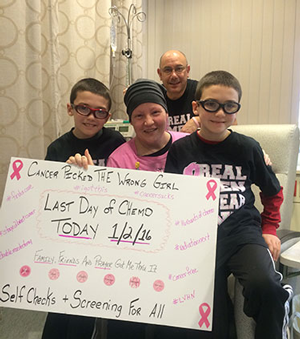
I finished chemo on January 2 of this year and had about 20 family and friends there with me as I received the last dose and rang that Last Treatment Bell loudly! It was an amazing feeling with so many days where I did not think I would make it through. I recovered from chemo for 4 weeks and then began 7 weeks of radiation 5 days a week on February 1.
While definitely easier than chemo, radiation is still pretty tough. I have permanent tattoos from where the beam traveled. I had severe skin issues–my skin completely opened up at the end–very painful. Radiation also causes lots of anxiety, as you hope it won’t hit your heart or lungs and cause long-term issues. I used to look at the machine and talk to it and then say a prayer – thanking God for finding my cancer in time and asking for continued healing power and for the beam to miss my heart.
I finished radiation on March 17 and recovered for a few weeks. I went back to work on April 4 after 6 months on disability. I was very happy to be able to return and begin to get my life back to normal.
CONQUER: What made you decide to start sharing your cancer experience on Facebook?
Ficco: When first diagnosed, I was very private and did not want anyone to know. This lasted maybe a week as I went through the additional testing and did my own research and joined the breastcancer.org forum discussions. This is a site that has been a source of unbelievable support for me. There is no other support like talking to other women who also just had a mastectomy or who were going through chemo. I created my own forum when starting radiation and had over 50 women join the forum for 3 plus months of radiation.
Breastcancer.org also has an annual fundraiser in Philadelphia every year called Rock the Ribbon. Last October I was honored at the event as one of their survivors. I was given star treatment with a day at Nordstroms to pick out shoes and a dress and then wig and makeup on the day of the event with overnight accommodations at the Ritz-Carlton! If it was not for breastcancer.org, I don’t think mentally I would have gotten through the past year as well. I actually have made some really good friends now as a result.
After sharing my story with immediate family and close friends, I began to realize that my outcome could have been so different. I decided to go public on Facebook to share my story so others could benefit. I did not want any of my friends or family members to go through what I was going though or worse. It was not easy at first. While I am a pretty outgoing person, this was very personal; sharing publicly helped me immensely. The support from friends on Facebook during the rough times would always put a smile on my face and give me strength.
CONQUER: You made a point of telling people that you were the reminder to get cancer screenings. What made you think to make that one of the central themes of your Facebook messages?
Ficco: I had friends tell me they were surprised I went to the doctor so soon since I had a clear mammogram 6 months earlier. Some said they knew they would have put it off. I had others share that they never do self-checks, asking me what the lump felt like. I even had some friends and people over 40 who shared they never had a mammogram.
Mary Ficco's Advice on Screenings
- Know your risks and proactively discuss them with your doctor regularly
- Never assume the screenings are enough, self-check for those cancers that you can
- Don’t be afraid to get the screenings; early detection saves lives (I met women who were not screened at age 40 and were now afraid to get screened for fear something would be found)
- And of course my normal reminder: daily self-checks + routine screening + see your doctor. If something does not seem or feel right, go to your doctor. This is a big one and can mean people saving their lives by acting on their concerns
- If diagnosed with dense breast tissue proactively discuss this with your doctor about whether additional screenings are needed and how often
- Get genetic testing done if you have a strong family history of cancer
While I am pretty sure my 3D mammogram in October 2014 missed my tumor, I still believe mammograms save lives. From what my friends were saying, it dawned on me that there are so many who don’t do any of what I was doing to stay on top of my risks, so I decided to add a theme to my Facebook posts to use me, Mary Doc (editor’s note: Dougherty is Ficco’s maiden name) as the reminder to do daily self-checks, and get routine screening. If diagnosed with dense tissue proactively talk to your doctor and see if any additional screening is needed. Also go to the doctor when something does not seem or feel right–that is a big one.
So many women put off going to the doctor and I easily could have done that. At that point my cancer was discovered, it had already spread to my lymph nodes. If I had pushed it off, it would have most likely metastasized to my bones (which is usually where breast cancer goes before hitting other organs). Then I would have been diagnosed with Stage 4 metastatic breast cancer. I feel very blessed that I felt the lump, went to the doctor, and had a radiologist who went the extra mile that day. I will take my Stage 2, and share that with others so that they use me as the reminder to not put any of it off.
CONQUER: What type of feedback have you gotten from people about openly communicating about your treatment on Facebook?
Ficco: I had several friends message me all throughout treatment that they were going for their first mammogram or now doing daily self-checks all because of my posts! I had many friends share that they did not know if they could have gone public the way I did, and that it was inspiring. Early detection is so critical in a cancer diagnosis, and if one person uses my story and is saved, there are no words to describe how that would make me feel. Again, going public helped me more than anyone would know; it gave me so much strength!
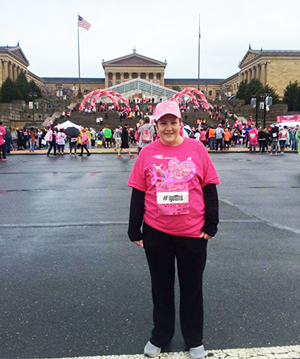
CONQUER: You participated in a Mother’s Day Breast Cancer event. Tell us about that day, and how it felt being around other survivors and families who had battled cancer.
Ficco: I was diagnosed last year right before Mother’s Day, and I kept seeing the advertisements of the Komen Race for the Cure in Philadelphia being held on Mother’s Day. I told my husband and family that “next year” I will be one of those in a pink survivor shirt on the Art Museum steps.
When the day arrived and I went to walk up the Art Museum steps to take my place as a survivor the feeling was amazing. I thanked God with every step for helping me get through it. There were women there who do it every year, and when they realized it was my first time they gave me big hugs and high-fives; it felt awesome! When they announced the survivors to start the race by coming down the steps I was overcome with such a feeling of sadness for all those who never got the chance to wear a pink survivor shirt. I just hope and pray someday there is a cure. My family and friends all walked the 5K Race together and had so much fun. When it was over, I had such a feeling of accomplishment and closure! I could finally start to return to normal or find my new normal.
CONQUER: Are you getting involved in any advocacy efforts? If so, what are you doing?
Ficco: I definitely want to find ways to pay forward the acts of kindness and generosity I received. I plan to participate in the Komen race yearly with a team. I will also volunteer at the Cancer Center at Lehigh Valley Hospital to be a support for other newly diagnosed breast cancer patients.
I have to wait a year after treatment to be accepted into their volunteer program. I recently threw out the first pitch at a Little League Baseball tournament raising funds for breast cancer. I was asked to do it last year, but I was not well enough. I am just so thankful to be past treatment and well enough to throw the pitch this year. It was a great experience and a great group of kids. Lastly, I would love to write a book about my experience.
CONQUER: How would characterize how you feel now?
Ficco: On March 28, my oncologist advised me that my status was now “NED” (No Evidence of Disease). All scans were clear. What a great feeling!
I feel relieved to be on the other side of treatment and to say “I had” cancer versus “I have” cancer. Physically, I still feel pretty wiped out most days. Doctors advised it does take up to a year to really recover from all the treatments. I still have some side effects that I may have to live with such as neuropathy in my fingers, legs, and feet; early sudden onset menopause; vision loss; etc.
As long as I am here to watch my boys grow up, I can live with the side effects. I am still finding my new normal and starting my new life after cancer. Although it is never far from me–as I am monitored every 3 to 6 months and have to take medication every day for 10 years–I have promised myself I will not live in fear of recurrence.





